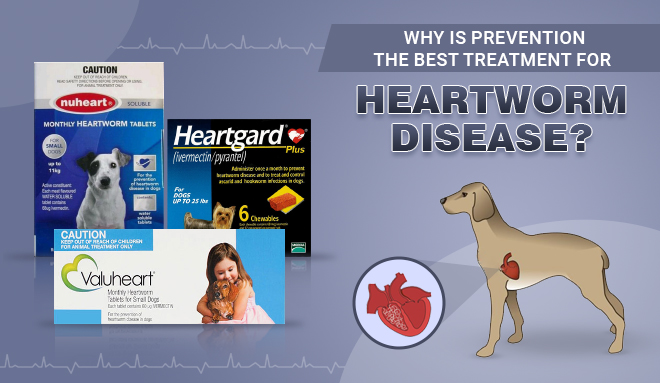Heartworm is a familiar name for dog parents. Not only the heart, but these worms also infect other critical organs of canine bodies including lungs, arteries, etc. If you turn a blind eye to these worms and don’t provide your dogs with appropriate care, heartworms can be fatal. What’s worth knowing is that heartworm disease can be prevented and we can still protect our canine friends from these deadly parasites. Read through this blog to discover how.
What is Heartworm Disease?
Heartworm disease in Dogs is caused by an infection of a worm called Dirofilaria immitis. The disease is transmitted by mosquitoes that carry heartworm larvae (microfilariae) from the infected host.
Once the heartworm larvae are transmitted to a healthy dog, microfilariae reach the blood vessels of the heart and lungs. After several months, the larvae grow into adult heartworms.
Signs of Heartworm Disease
Dogs infected with heartworms show little to no signs at all in the early stages of the infection. The severity of the illness is directly related to the duration of the infection and the total number of worms living inside the dog’s body. Some of the common signs of heartworm disease include,
- coughing
- labored breathing
- blood in cough
- nose bleeding
- intolerance to exercise
- discoloration of gums & skin
- accumulation of fluid in the abdominal cavity
Complications of Heartworm Disease
Heartworm disease is not limited to the canine heart. In its advanced stages, the disease also infects the lungs resulting in severe lung disease. It causes long-lasting damage to the heart, arteries, lungs and other critical organs.
The illness significantly compromises the health of affected dogs, even after the disease is treated. Take a look at the critical complications caused by Heartworm disease:
- Allergic Pneumonitis: Involves pulmonary capillaries, causing cough, weight loss, etc.
- Congestive heart failure: Results in right heart failure
- Pulmonary embolization: Results in the blockage of blood vessel(s)
Why Heartworm Prevention is Important?
Once a dog is infected with heartworm disease, the treatment of adult heartworms is a long, troublesome procedure for dogs and dog parents. The treatment includes arsenic-containing drugs which are toxic for dogs and leave dogs with long-lasting complications. Therefore, it’s better to prevent the disease before it’s too late.
Here are more reasons to prevent this disease at all costs:
- There are approximately 70 species of mosquitoes that can transmit the heartworm disease to dogs.
- All 50 states in the USA are reported with canine heartworm disease.
- Other than the USA, countries including Australia, Canada and Southern Europe and Latin America have active cases.
- Both indoor and outdoor dogs are susceptible to the infection.
- The majority of the infective larvae can develop into adult heartworms.
- Adult heartworms are only detected after 5 months of the infection.
- Dogs show absolutely no signs during the early stages of heartworm infection.
- Heartworms can damage dog’s heart, lungs, kidneys and liver.
- The treatment of heartworms is expensive as it requires hospitalization, vet visits, investigations, etc.
- Heartworm treatment may cause blood clots in the dog’s lungs.
Popular Heartworm Preventives
Now, take a look at some of the popular heartworm preventives for dogs.
(Ivermectin, Pyrantel)
Recommended dosage: One chew per month
(Ivermectin)
Recommended dosage: One tablet every month
(Ivermectin)
Recommended dosage: One tablet per month
Prevention is the Best Treatment
Heartworms are potentially life-threatening worms. These parasites are only detected in the dog’s blood after 6 months of infection. And symptoms surface once the disease has already advanced. Therefore, it is critical to prevent the disease before things worsen. Talk to a veterinarian and use quality heartworm preventive all year round to keep your canine friends protected from these deadly worms.

